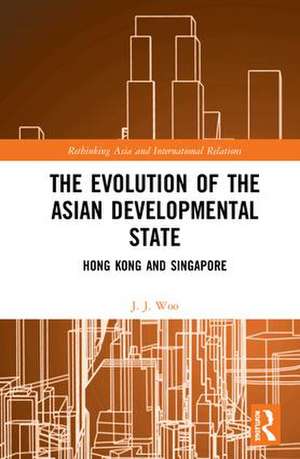The Evolution of the Asian Developmental State: Hong Kong and Singapore: Rethinking Asia and International Relations
Autor J. J. Wooen Limba Engleză Hardback – 20 aug 2018
Providing a theoretical and empirical discussion of the Asian developmental state model, the book assesses the evolution of the developmental state model, considers recent developments in the field and evaluates the development state’s continued relevance as a conceptual framework for understanding the politics of economic development. Focusing on digital and technology-enabled economic activities in Hong Kong and Singapore, the author explores the various policies that allow developmental states to stimulate economic growth, ensure organizational coherence, and engage businesses and other stakeholders.
This book will be of interest to scholars and researchers of political economy and economic development in Asia as well as business professionals and other practitioners.
| Toate formatele și edițiile | Preț | Express |
|---|---|---|
| Paperback (1) | 381.21 lei 6-8 săpt. | |
| Taylor & Francis – 30 iun 2021 | 381.21 lei 6-8 săpt. | |
| Hardback (1) | 762.97 lei 6-8 săpt. | |
| Taylor & Francis – 20 aug 2018 | 762.97 lei 6-8 săpt. |
Din seria Rethinking Asia and International Relations
- 17%
 Preț: 258.91 lei
Preț: 258.91 lei -
 Preț: 383.71 lei
Preț: 383.71 lei -
 Preț: 476.86 lei
Preț: 476.86 lei - 17%
 Preț: 213.58 lei
Preț: 213.58 lei - 16%
 Preț: 241.15 lei
Preț: 241.15 lei -
 Preț: 469.34 lei
Preț: 469.34 lei -
 Preț: 381.72 lei
Preț: 381.72 lei - 26%
 Preț: 819.48 lei
Preț: 819.48 lei - 31%
 Preț: 764.20 lei
Preț: 764.20 lei -
 Preț: 388.64 lei
Preț: 388.64 lei -
 Preț: 402.94 lei
Preț: 402.94 lei - 17%
 Preț: 222.32 lei
Preț: 222.32 lei -
 Preț: 399.29 lei
Preț: 399.29 lei - 26%
 Preț: 764.36 lei
Preț: 764.36 lei - 18%
 Preț: 1058.38 lei
Preț: 1058.38 lei - 18%
 Preț: 1002.99 lei
Preț: 1002.99 lei - 12%
 Preț: 299.52 lei
Preț: 299.52 lei - 16%
 Preț: 241.15 lei
Preț: 241.15 lei -
 Preț: 390.37 lei
Preț: 390.37 lei - 17%
 Preț: 246.93 lei
Preț: 246.93 lei - 13%
 Preț: 297.99 lei
Preț: 297.99 lei - 31%
 Preț: 767.38 lei
Preț: 767.38 lei -
 Preț: 463.58 lei
Preț: 463.58 lei - 26%
 Preț: 762.16 lei
Preț: 762.16 lei -
 Preț: 469.34 lei
Preț: 469.34 lei - 31%
 Preț: 765.45 lei
Preț: 765.45 lei - 26%
 Preț: 764.20 lei
Preț: 764.20 lei - 30%
 Preț: 847.86 lei
Preț: 847.86 lei -
 Preț: 383.33 lei
Preț: 383.33 lei - 25%
 Preț: 767.01 lei
Preț: 767.01 lei - 18%
 Preț: 1004.55 lei
Preț: 1004.55 lei - 18%
 Preț: 1109.18 lei
Preț: 1109.18 lei - 26%
 Preț: 679.92 lei
Preț: 679.92 lei
Preț: 762.97 lei
Preț vechi: 1102.05 lei
-31% Nou
Puncte Express: 1144
Preț estimativ în valută:
145.99€ • 152.84$ • 120.80£
145.99€ • 152.84$ • 120.80£
Carte tipărită la comandă
Livrare economică 05-19 aprilie
Preluare comenzi: 021 569.72.76
Specificații
ISBN-13: 9781138070264
ISBN-10: 1138070262
Pagini: 174
Ilustrații: 6
Dimensiuni: 156 x 234 x 13 mm
Greutate: 0.39 kg
Ediția:1
Editura: Taylor & Francis
Colecția Routledge
Seria Rethinking Asia and International Relations
Locul publicării:Oxford, United Kingdom
ISBN-10: 1138070262
Pagini: 174
Ilustrații: 6
Dimensiuni: 156 x 234 x 13 mm
Greutate: 0.39 kg
Ediția:1
Editura: Taylor & Francis
Colecția Routledge
Seria Rethinking Asia and International Relations
Locul publicării:Oxford, United Kingdom
Public țintă
PostgraduateCuprins
Chapter 1 Introduction
Chapter 2 Developmental States: A Conceptual Overview
Chapter 3 Singapore Inc.
Chapter 4 Hong Kong: Administrative Developmental State
Chapter 5 Becoming Smart Cities
Chapter 6 Conceptual and Theoretical Implications
Chapter 7 The Smart Developmental State
Chapter 2 Developmental States: A Conceptual Overview
Chapter 3 Singapore Inc.
Chapter 4 Hong Kong: Administrative Developmental State
Chapter 5 Becoming Smart Cities
Chapter 6 Conceptual and Theoretical Implications
Chapter 7 The Smart Developmental State
Notă biografică
J.J. Woo is Assistant Professor of Singapore and Southeast Asian Politics in the Public Policy and Global Affairs Programme of Nanyang Technological University, Singapore. From 2016 to 2017, he was Rajawali Fellow at the John F. Kennedy School of Government at Harvard University, where he worked on policy co-creation in Singapore. Dr Woo received his PhD from the Lee Kuan Yew School of Public Policy, National University of Singapore and holds an MSc (International Political Economy) from the S. Rajaratnam School of International Studies, Nanyang Technological University.
Recenzii
"This book provides a much overdue contribution to our understanding of the developmental dynamics of some of Asia’s most celebrated city states: Singapore and Hong Kong. By revisiting the developmental state thesis and analysing the policy challenges posed by the rise of the knowledge economy and the increasing impact of digitization, the author is able to demonstrate how the adoption of smart city strategies is increasingly supplanting traditional approaches to developmental policy, planning and economic management. A timely, thoughtful and innovative book that speaks to students of international political economy, development and policymakers alike." - Darryl S.L. Jarvis, Professor and Head of Department of Asian and Policy Studies, Education University of Hong Kong.
Descriere
Providing a theoretical and empirical discussion of the Asian developmental state model this book addresses recent developments in the field and assess the development state’s continued relevance as a conceptual framework for understanding the politics of economic development.
